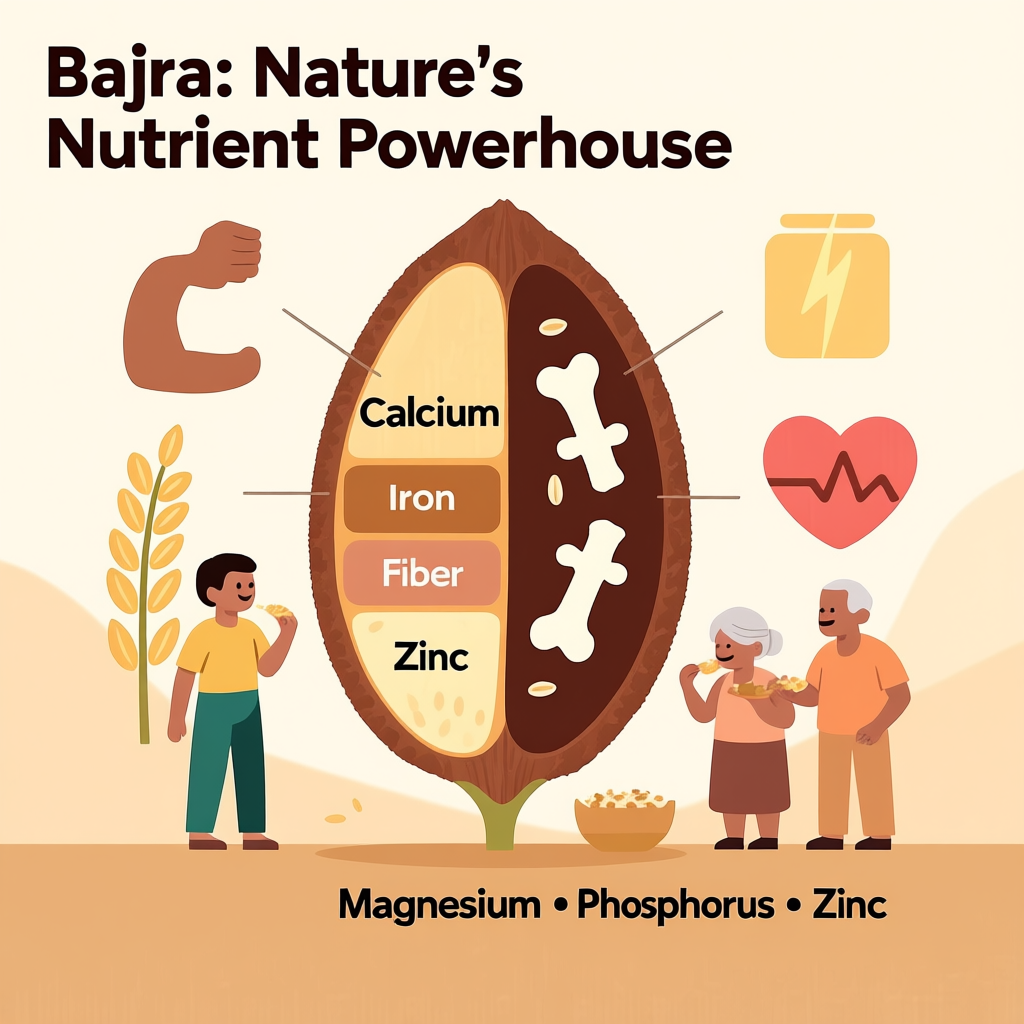Jowar, also known as sorghum, is a gluten-free, nutrient-rich cereal grain widely consumed in India and other parts of Africa and Asia. It is a staple food in many regions, especially in arid and semi-arid climates due to its drought resistance. Jowar is a powerhouse of nutrients and offers numerous health benefits.
Nutritional Profile of Jowar (per 100g raw grain)
|
Nutrient
|
Calorie
|
|---|---|
|
Calories
|
339 kcal
|
|
Carbohydrates
|
72 g
|
|
Protein
|
10.6 g
|
|
Dietary Fiber
|
6.3 g
|
|
Fat
|
3.5 g
|
|
Calcium
|
25 mg
|
|
Iron
|
4.4 mg
|
|
Magnesium
|
165 mg
|
|
Phosphorus
|
287 mg
|
|
Potassium
|
350 mg
|
|
Zinc
|
2.4 mg
|
|
Thiamine (B1)
|
0.4 mg
|
|
Niacin (B3)
|
2.9 mg
|
|
Folate
|
30 µg
|
|
Gluten
|
0 (Gluten-free)
|
Health Benefits of Jowar (Sorghum)
1. Gluten-Free Alternative
- Ideal for people with celiac disease or gluten sensitivity.
- Can be used to make rotis, porridge, dosa, and even baked goods.
2. Rich in Protein and Essential Amino Acids
- Contains more protein than many other cereals like rice.
- Provides essential amino acids such as methionine and cysteine, especially when combined with pulses.
3. High in Dietary Fiber
- Promotes digestive health and prevents constipation.
- Helps regulate bowel movements and supports a healthy gut microbiome.
- May reduce the risk of colon cancer.
4. Supports Blood Sugar Control
- Low to moderate glycemic index (GI) compared to refined grains.
- The high fiber content slows glucose absorption, helping manage diabetes.
- Polyphenols in jowar may also improve insulin sensitivity.
5. Rich in Antioxidants
- Contains phenolic compounds, tannins, and flavonoids (especially in darker varieties).
- These antioxidants help combat oxidative stress and reduce inflammation.
- May lower the risk of chronic diseases like heart disease and cancer.
6. Heart Health
- High in potassium and magnesium, which help regulate blood pressure.
- Helps reduce LDL (“bad”) cholesterol due to its fiber and phytosterol content.
- Supports healthy circulation and cardiovascular function.
7. Weight Management
- High fiber and protein content increase satiety, reducing overeating.
- Keeps you full for longer, aiding in weight loss or maintenance.
8. Bone Health
- Good source of calcium, magnesium, and phosphorus – all essential for strong bones and teeth.
- Helps prevent osteoporosis, especially in older adults.
9. Iron-Rich – Fights Anemia
- Contains a decent amount of iron (4.4 mg per 100g).
- Helps prevent iron-deficiency anemia, especially when paired with vitamin C-rich foods.
10. Cancer-Protective Properties
- Certain compounds in jowar, like 3-deoxyanthocyanidins, have shown anti-cancer activity in studies.
- High fiber intake is linked to reduced risk of colorectal cancer.
11. Eco-Friendly and Sustainable
- Requires less water than rice or wheat.
- Grows well in poor soil conditions, making it climate-resilient.
Precautions & Considerations
- Anti-Nutrients: Like other grains, jowar contains phytic acid, which can reduce mineral absorption. Soaking, fermenting, or roasting helps reduce this.
- Oxalate Content: High oxalate levels may be a concern for people prone to kidney stones. Moderation is key.
- Allergies: Rare, but possible. Monitor for any allergic reactions.
Combine jowar with lentils, vegetables, and healthy fats for a balanced, nutritious meal.
Foods to Avoid or Limit When Eating Jowar
1. Calcium-Rich Foods (e.g., Milk, Yogurt, Cheese)
- Jowar contains phytic acid (phytates), which binds with calcium, iron, and zinc, reducing their absorption.
- Avoid pairing jowar roti with milk or curd at the same meal
2. Iron Inhibitors: Tea, Coffee, Red Wine
- These contain tannins and polyphenols that strongly inhibit non-heme iron absorption from jowar
- Avoid drinking tea or coffee immediately before, during, or after a jowar-based meal.
- Wait at least 1 hour after eating to consume tea/coffee.
3. High-Oxalate Foods (e.g., Spinach, Beet Greens, Cocoa)
- Jowar itself has moderate oxalate content. Combining it with high-oxalate foods increases the total oxalate load, which may contribute to kidney stone formation in susceptible individuals.
- Avoid pairing jowar roti with saag (spinach) or beetroot leaves.
- Pair with low-oxalate greens like bottle gourd (lauki), ash gourd, or cabbage.
4. Foods High in Phytates (e.g., Raw Nuts, Seeds, Unfermented Soy)
- Both jowar and these foods contain phytic acid. Combined, they can significantly reduce mineral absorption (iron, zinc, calcium).
- Avoid large servings of raw almonds, flaxseeds, or soy chunks with jowar meals.
- Soak, roast, or sprout nuts/seeds to reduce phytates, or consume them at a different time.
5. Certain Legumes (if not soaked/fermented)
- Some legumes (like raw kidney beans or unsoaked chana) are high in phytates and tannins, which can further hinder mineral uptake when eaten with jowar.
- Combine jowar with well-soaked, cooked, or fermented lentils (e.g., idli/dosa batter) to improve digestibility and nutrient availability.
Smart Food Pairings That Enhance Jowar’s Nutrition
To boost nutrient absorption, pair jowar with:
|
Nutrient in jowar
|
Best enhancer
|
Example
|
|---|---|---|
|
Iron
|
Vitamin C-rich foods
|
Lemon chutney, tomato, bell peppers, amla, orange
|
|
Protein
|
Legumes (dal, sprouts)
|
Jowar roti + moong dal = complete protein
|
|
Calcium & Phosphorus
|
Moderate dairy (with gap)
|
Have curd 1–2 hours after jowar meal
|
|
Fiber & Satiety
|
Healthy fats
|
Ghee (in moderation), avocado, coconut chutney
|
Tips to Improve Nutrient Absorption from Jowar
- Soak jowar flour for 6–8 hours before making roti or dosa.
- Ferment when possible (e.g., jowar dosa) — reduces phytates and boosts B vitamins.
- Roast grains lightly before cooking — helps break down anti-nutrients.
- Pair with vitamin C — squeeze lemon on jowar dishes or serve with tomato-based curries.
- Space out inhibitors — avoid tea/coffee 1 hour before and after meals.
What NOT to Combine with Jowar
|
Avoid with
|
Reason
|
Better Alternatives
|
|---|---|---|
|
Milk, curd, cheese
|
Phytates block calcium/iron
|
Consume dairy 2–3 hours apart
|
|
Tea, coffee
|
Tannins block iron
|
Drink 1 hour after meals
|
|
Spinach, beet greens
|
High oxalate combo
|
Use low-oxalate veggies
|
|
Raw nuts/seeds
|
Add more phytates
|
Soak or roast them first
|
|
Unsoaked legumes
|
Reduce mineral absorption
|
Use soaked/cooked dals
|
Jowar is a powerhouse grain — just be mindful of what you pair it with to unlock its full nutritional potential.



